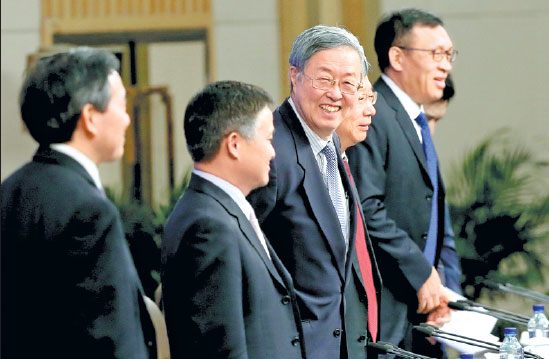Stability expected for yuan this year
By Wang Yanfei (China Daily) Updated: 2017-03-11 06:55Sound economic fundamentals and a promising outlook for the world's second-largest economy will help the yuan to naturally stabilize this year, senior officials with the central bank said on Friday.
Zhou Xiaochuan, head of the People's Bank of China, said the yuan is expected to remain at a basically stable level this year, thanks to achievements in supply-side structural reform and promising signs that have appeared since the fourth quarter of last year.
"The market now has brighter expectations for future economic trends," said Zhou, who spoke at a news conference on the sidelines of the annual session of the National People's Congress, the top legislature. "That will help put the exchange rate of the yuan on a trend to become more stable."
A prudent monetary policy that is expected to support supply-side structural reform and squeeze asset bubbles will also help sustain the good trend of economic growth this year, according to Yi Gang, vice-governor of the central bank.
As for short-term fluctuation, Zhou said there is no need to read too much into it. Short-term depreciation will not become long-lasting pain, he said.
The central bank set the central parity rate of the yuan at 6.9123 against the dollar on Friday before the market opened, only several points away from what market observers see as the 7-yuan psychological threshold.
Zhou's remarks come amid rising market expectations of a US interest rate hike this month, which have pulled up the dollar index recently. The dollar index went up by about 0.4 percent last week.
Zhou refused to take the interest rate gap between China and the United States as a factor that will lead to long-term depreciation pressure on the yuan, saying a currency's exchange rate is determined by economic fundamentals.
Looking ahead, Yi said the central bank will allow the currency to fluctuate within a reasonable range while continuing to implement the exchange rate reform based on market-based principles.
Yi said China will also appropriately use foreign exchange reserves, which now stand at around $3 trillion, to help keep the yuan's exchange rate stable.
The central bank will also implement policies for regulating the forex market "in a more precise way" this year, but will not introduce new policies to put stricter controls on capital flows, according to Zhou.
Starting this year, the State Administration of Foreign Exchange has tightened oversight of outbound investment in the property, entertainment, sports and other sectors.
Wang Youxin, an economist with Bank of China, said such efforts will continue at least in the short run to further ease capital outflow pressures.
Strengthened efforts to ensure legitimate outbound investment have helped squeeze out some irrational outbound investment, according to Wang.
wangyanfei@chinadaily.com.cn
Highlights
China may strengthen financial asset checks
China could update the level of financial asset regulation if necessary to tackle "serious problems" in the country's financial product market, People's Bank of China Governor Zhou Xiaochuan said on Friday.
Zhou said the major regulatory bodies overseeing the banking, securities and insurance sectors, the central bank and the foreign exchange administration have reached a consensus on a way forward, with detailed management policies to come out later.
The level of regulation may be further raised if necessary, he added, without elaborating on what that might involve.
Deleveraging process cannot be rushed
The deleveraging process needs to be implemented steadily, senior officials with the central bank said on Friday.
Yi Gang, vice-governor of the bank, said the deleveraging process cannot be implemented at a fast pace, in order to fend off financial risks. "The first step is to control the leverage level," Yi said.
Central bank Governor Zhou Xiaochuan said the financial sector should refuse to support enterprises with high leverage ratios.
Slower growth forecast for mortgage loans
Mortgage loans are expected to record slower growth this year, while extension of these loans will help to reduce real estate stocks in lower-tier cities. But this may lead to price rises in major cities, central bank Governor Zhou Xiaochuan said, adding that mortgage loans can boost growth of related industries.
"We should adopt a relatively balanced policy (on mortgage loans)," said Zhou.
Xin Zhiming and Wang Yanfei
|
People tend to a protester who fainted during a march supporting South Korean President Park Geun-hye near the Constitutional Court in Seoul, South Korea, on Friday. Stringer / Reuters |
- 'Cooperation is complementary'
- Worldwide manhunt nets 50th fugitive
- China-Japan meet seeks cooperation
- Agency ensuring natural gas supply
- Global manhunt sees China catch its 50th fugitive
- Call for 'Red Boat Spirit' a noble goal, official says
- China 'open to world' of foreign talent
- Free trade studies agreed on as Li meets with Canadian PM Trudeau
- Emojis on austerity rules from top anti-graft authority go viral
- Xi: All aboard internet express












